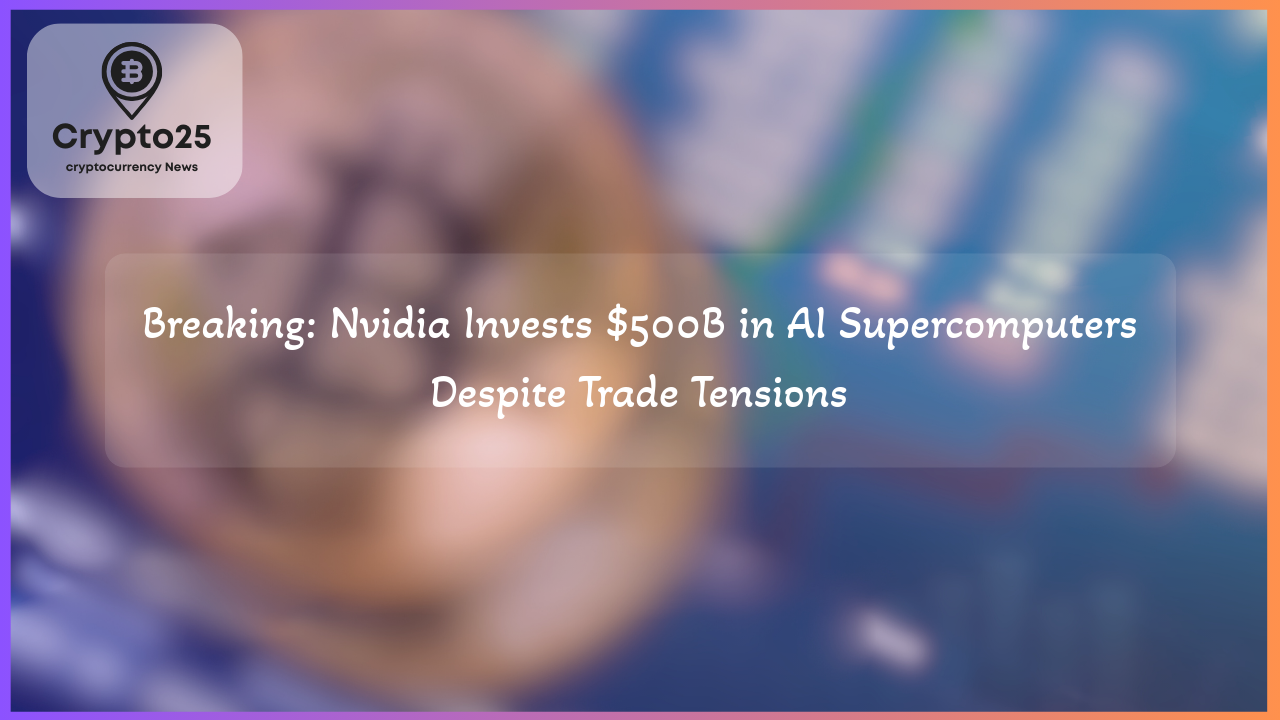
Nvidia Invests $500 Billion in U.S. AI Manufacturing Infrastructure
Nvidia, the global leader in high-performance AI technology, is responding to mounting geopolitical and economic challenges by committing $500 billion to expand its AI supercomputing manufacturing operations in the United States. This strategic move underscores the growing demand for AI infrastructure and signals a broader push for localized production amid U.S.-China trade tensions and shifting global supply chains.
### Nvidia Strengthens Global AI Leadership with U.S. Expansion
In a bold affirmation of its status as an industry leader, Nvidia revealed plans to establish manufacturing facilities in Phoenix, Dallas, and Houston. These sites will play a pivotal role in producing the company’s cutting-edge Blackwell chips and AI supercomputers. Spanning over one million square feet collectively, these facilities are expected to become operational within the next two years, positioning Nvidia to lead the U.S. in AI manufacturing capabilities.
The decision to expand within the U.S. dovetails with escalating trade restrictions and a surge in domestic manufacturing priorities. A significant portion of Nvidia’s current supply chain relies heavily on overseas partners like Taiwan Semiconductor Manufacturing Company (TSMC). By diversifying operations and utilizing local resources, Nvidia aims not only to meet surging AI demands but also to enhance supply chain resilience and mitigate risks tied to international dependencies.
### U.S.-China Trade Tensions and Nvidia’s Strategic Shift
The ongoing U.S.-China trade war and imposition of tariffs have pressured tech giants such as Nvidia to reduce reliance on foreign manufacturing, especially in critical industries like semiconductors and AI. The United States government, under the Trump Administration, heavily touted domestic manufacturing as a cornerstone of its economic policy. Nvidia’s investment signals its alignment with this vision, reinforcing national security interests and addressing logistical complexities exacerbated by geopolitical instability.
Jensen Huang, Nvidia’s CEO, elaborated on the significance of the initiative: “The engines of the world’s AI infrastructure are being built in the United States for the first time. Adding American manufacturing helps us better meet the incredible and growing demand for AI chips and supercomputers, strengthens our supply chain, and boosts our resiliency.”
These efforts reflect the broader trend of onshoring critical technologies while collaborating with partners like Foxconn and Wistron to streamline the transition.
| Title | Details |
|---|---|
| Market Cap | $1.2 Trillion |
### Challenges in Nvidia’s Transition to Localized AI Chip Manufacturing
Although Nvidia’s ambitious expansion reflects its commitment to domestic manufacturing, the company faces challenges in fully transitioning its operations. Historically, Taiwan has been central to Nvidia’s supply chain due to its advanced semiconductor manufacturing ecosystem. Taiwan Semiconductor Manufacturing Company, which continues to supply Nvidia’s Blackwell chips, is integral to supporting the company’s advanced AI product lines.
Additionally, Nvidia’s ability to ramp up production and meet accelerating global demand hinges on efficient coordination with U.S.-based manufacturing partners. Establishing a cohesive supply chain strategy that blends localized and international efforts could prove pivotal in achieving its $500 billion infrastructure goal over the next few years.
The financial markets have responded to Nvidia’s announcement with measured interest. Despite a brief dip in Nvidia’s stock at the beginning of trading, shares showed resilience, climbing above $111.70 and reflecting investor confidence in the company’s long-term U.S. manufacturing ambitions. This development follows previous government-supported initiatives to stimulate domestic innovation and infrastructure development in critical tech industries, such as artificial intelligence and semiconductors.
### U.S. Policies and Nvidia’s Vision for the Future
The investment comes as part of a larger governmental push to establish the United States as a global leader in AI innovation and production. The Trump Administration played a significant role in championing domestic manufacturing, and Nvidia’s actions largely echo this national strategy. Policies aimed at incentivizing U.S.-based manufacturing are widely considered a response to the need for self-reliance in emerging technologies, particularly against a backdrop of international crises and intensifying trade rivalries.
In addition to Nvidia’s investments, America’s AI strategy has recently gained momentum through projects like Stargate, a $500 billion AI initiative led by Oracle, Softbank, and OpenAI. Stargate serves as a broader effort to position the U.S. as a dominant player in global tech ecosystems. Nvidia’s announcement aligns with this vision, aiming to scale both production capacity and technological influence.
As AI supercomputing becomes a transformative force in industries ranging from healthcare to finance, Nvidia’s move underscores the strategic importance of building domestic infrastructure. The future of AI innovation hinges on both manufacturing capabilities and policy support, making this a defining moment in the intersection of technology and global economics.
